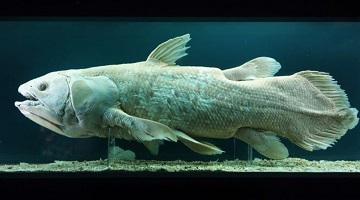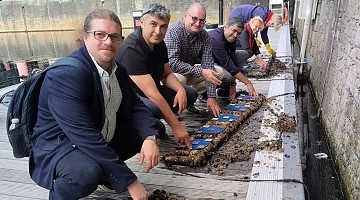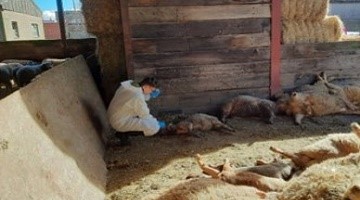Why study this course with LJMU?
- A practical, hands-on course, taught using state-of-the-art teaching laboratories
- 100% of students surveyed said this course challenged them to achieve their best work (National Student Survey 2024)
- Gain an understanding of the principles and applications of biotechnology and practise the latest molecular, bioprocessing and analytical techniques
- Offers fascinating research projects in areas such as synthetic biology, genetic engineering of crop plants, fermentation technology, bioremediation and antimicrobial resistance
- Benefit from strong links with industry for industrial placements
- Excellent spring board into careers as diverse as biopharmaceutical manufacturing, drug discovery and development, food technology and biofuel production
- Opportunities to undertake a year's industrial placement or work abroad
- Stepping stone to postgraduate study in MSc Industrial Biotechnology
About your course
The BSc (Hons) Biotechnology with Foundation Year at Liverpool John Moores University is the ideal course if you are interested in this subject, but lack the necessary qualifications to study it at degree level.
About the Foundation Year
The Foundation Year is ideal if you have the ability to study for a degree but dont have the qualifications to enter directly onto the Biotechnology honours degree programme. Once you pass the Foundation Year, you will progress directly onto the first year of the honours degree. If you are a full-time UK student, you will qualify for student financial support for the full duration of your course (subject to eligibility criteria).
About the BSc (Hons) Biotechnology degree
Biotechnology is a fascinating field of study, which has had a positive impact on many aspects of our lives, with applications across medicine, food and the environment. This multidisciplinary science builds on a foundational knowledge of molecular and cell biology, microbiology and biochemistry, using transgenic plants, animals and microbes to develop valuable technologies and products. Early known examples of biotechnology include the use of microorganisms to make cheese, bread and wine, but advances in genetic engineering and recombinant DNA technology have revolutionised the biotechnology industry. Modern biotechnology has enabled production of drugs, vaccines, energy, industrial chemicals and progressed developments in gene therapy, cancer therapy and sustainable agriculture.
This is a practical, hands-on course in which you will spend a large proportion of your time in our excellent teaching labs for cell culture, molecular biology and imaging studies, practising the latest molecular, bioprocessing and analytical techniques. You will gain an understanding of the principles and applications of biotechnology across this broad-based sector. Optional modules and a research project in the final year provide opportunities to specialise in your own particular area of interest. You will have plenty of opportunities to put your skills and knowledge into practice and explore your own interests by completing a research project. The option to do a years industrial placement between the second and third year will also help develop transferable skills, valued by employers.
The programme enables you to develop intellectual independence, critical awareness and transferable skills attributes that are vital for employment. There is an emphasis on career development, with additional input from external speakers from industry, increasing your understanding of the business of biotechnology. As well as exploring a wide range of career options, you will develop commercial awareness and learn how new start-up biotechnology companies are created.
Opportunities for study abroad and placements
The School of Pharmacy and Biomolecular Sciences has an excellent track record of providing relevant vocational training for students. Students are supported by Erasmus and Professional Training Tutors who are responsible for advertising placements and promoting vocational training to students.
Course modules
What you will study on this degree
Further guidance on modules
Modules are designated core or optional in accordance with professional body requirements, as applicable, and LJMU’s Academic Framework Regulations. Whilst you are required to study core modules, optional modules provide you with an element of choice. Their availability may vary and will be subject to meeting minimum student numbers.
Where changes to modules are necessary these will be communicated as appropriate.
Core modules
Core modules
Core modules
Optional Modules
Core modules
Optional Modules
Your Learning Experience
Excellent facilities and learning resources
We adopt an active blended learning approach, meaning you will experience a combination of face-to-face and online learning during your time at LJMU. This enables you to experience a rich and diverse learning experience and engage fully with your studies. Our approach ensures that you can easily access support from your personal tutor, either by meeting them on-campus or via a video call to suit your needs.
The amount of time you spend in each varies according to the module and the level of study. Laboratory sessions give you a chance to develop your practical skills, while workshops and tutorials provide opportunities to discuss course material more informally. All lecture material will be available on our virtual learning environment, Canvas.
You will also be expected to do additional research around lecture subjects in your own time using the University Libraries. As the course progresses, the amount of practical and independent work increases, allowing you to develop research techniques and complete a research project.
Work-related learning
As part of your work-related learning, we highly recommend that you opt to undertake a years work placement after your second year. This will not only give you a chance to put into practice what you have learnt in the first two years, but it will also help you develop your personal skills, earn a salary while taking a years break from formal study and give you a competitive edge when you enter the graduate job market.
If you opt to take a year out on work placement, our Placement Learning and Support Unit will guide you in finding, applying for and securing a placement. During the year, you will have ongoing support from a member of staff, which will include visits to your workplace.
Dedicated personal tutor, plus study skills support
Throughout your course you will have the support of a personal tutor who will be available to discuss course-related matters in both tutorial sessions and on a one-to-one basis. In your final year, you will also have a dedicated supervisor who will provide support during your research project.
The school is fully committed to promoting a learning environment that supports a culture of equality, diversity and inclusivity (EDI) and has a Disability Support Coordinator, an EDI Coordinator and a School EDI Working Group. Personal Tutors also play a vital role in promoting awareness of support services for students.
Assessment varies depending on the modules you choose, but will usually include a combination of exams and coursework.
Most modules are assessed through a combination of exam and coursework and some via coursework only. Exams are normally held at the end of each semester.
- Exams may include a range of question types e.g. multiple choice, short answer, interpretative, problem-based learning and essay questions
- Coursework assessment could be in the form of phase tests, practical reports, data handling, oral presentations, poster presentations, group discussions, essays or demonstrating competence in core practical skills. Most coursework assessments are based on individual assignments but some require group work
Feedback on coursework assessments is normally provided within three weeks of submission and may be via Canvas (our virtual learning environment), face-to-face or in writing. We believe that constructive feedback is vital in helping you identify your strengths as well as the areas where you can improve your work.
Where you will study
What you can expect from your School
You will study at the Byrom Street site in the university's City Campus in the heart of Liverpool. Our state-of-the-art laboratories and teaching spaces will ensure you enjoy a first-class study environment. The Avril Robarts library is within easy walking distance and here you'll find all the information you need to support your studies.
Course tutors

Dr Ismini Nakouti
- Programme Leader
It is a privilege to be able to support students' academic journey, and helping them to achieve their goals is the best part of my job. It is particularly rewarding to see students develop their confidence and skills when working in the laboratory, practicing the latest biotechnology techniques
It is a privilege to be able to support students' academic journey, and helping them to achieve their goals is the best part of my job. It is particularly rewarding to see students develop their confidence and skills when working in the laboratory, practicing the latest biotechnology techniques
Dr Nakouti is a Senior Lecturer in Clinical Microbiology and teaches over the Biotechnology, Pharmacy and Biomedical Sciences subject areas. Her teaching is underpinned by her active research in the areas of diagnostic microbiology, natural products discovery and process development. Dr Nakouti has a PhD in Medical Microbiology and has previously worked for Unilever Research, BEST Research Institute and the National Biomanufacturing Centre. She disseminates her research at both national and international scientific meetings and regularly engages with LJMU outreach activities, giving talks and delivering workshops to schools and the local community.
-
 Lecturer/Senior Lecturer
Lecturer/Senior Lecturer


The BSc Biotechnology course provides a great springboard for a career within the fast-growing Life Sciences sector. The industry-relevant course content, coupled with hands-on lab experience, are great enablers for those wishing to explore industry opportunities. This is a high-quality programme supporting industry, which I would strongly recommend!
Career paths
Graduates will be equipped with the knowledge and skills to pursue employment opportunities world-wide
Biotechnology graduates are employable in a wide range of industries and organisations, such as pharmaceutical, healthcare, environmental, food industries or regulatory authorities. Some graduates may prefer to continue their studies with postgraduate study (PGCE/PGDE, MSc, MPhil, MRes or PhD) in topics as wide ranging as industrial biotechnology, biomedical sciences, drug discovery and design, cosmetic science, and medical microbiology. The programme is the ideal stepping stone to the MSc Industrial Biotechnology offered by LJMU.
Student Futures - Careers, Employability and Enterprise Service
A wide range of opportunities and support is available to you, within and beyond your course, to ensure our students experience a transformation in their career trajectory. Every undergraduate curriculum includes Future Focus during Level 4, an e-learning resource and workshop designed to help you to develop your talents, passion and purpose.
Every student has access to Careers Zone 24/7, LJMU's suite of online Apps, resources and jobs board via the LJMU Student Futures website.
Tuition fees and funding
The University reserves the right to increase tuition fees in accordance with any changes to the maximum allowable fees set by the UK Parliament. In the event of such a change, any fee increase will be subject to a maximum cap of 10% of the total course cost as originally stated at the time of your offer.
The fees quoted above cover registration, tuition, supervision, assessment and examinations as well as:
- library membership with access to printed, multimedia and digital resources
- access to programme-appropriate software
- library and student IT support
- free on-campus wifi via eduroam
Additional costs
Although not all of the following are compulsory/relevant, you should keep in mind the costs of:
- accommodation and living expenditure
- books (should you wish to have your own copies)
- printing, photocopying and stationery
- PC/laptop (should you prefer to purchase your own for independent study and online learning activities)
- mobile phone/tablet (to access online services)
- field trips (travel and activity costs)
- placements (travel expenses and living costs)
- student visas (international students only)
- study abroad opportunities (travel costs, accommodation, visas and immunisations)
- academic conferences (travel costs)
- professional-body membership
- graduation (gown hire etc)
Funding
There are many ways to fund study for home and international students. From loans to International Scholarships and subject-specific funding, you'll find all of the information you need on our specialist funding pages.
A DBS check is not required for your application, however a DBS may be required for modules where there is a work based learning placement option. Work based learning placements that do not require a DBS check are available.
Entry requirements
Please choose your qualifications below to view requirements
Grades/points required from qualifications: CCD-CCC (88-96)
Work out how many UCAS points your qualifications are worth by visiting the UCAS Tariff Calculator.
Qualification requirements
How to apply
Securing your place at LJMU
UCAS is the official application route for our full-time undergraduate courses. Further information on the UCAS application process can be found here https://www.ljmu.ac.uk/study/undergraduate-students/how-to-apply.
Your university life
From accommodation and academic support to clubs and societies. Find out what LJMU has to offer.
Related Links
Talk to our students
Connect with a current LJMU student for advice and guidance on university life, courses and more.
See what our students are saying
At LJMU we want you to know you're making the right choice by studying with us. You can see what our students are saying about their experience with us through their reviews on the following websites:
Related Links
News and views
Browse through the latest news and stories from the university
The university reserves the right to withdraw or make alterations to a course and facilities if necessary; this may be because such changes are deemed to be beneficial to students, are minor in nature and unlikely to impact negatively upon students or become necessary due to circumstances beyond the control of the university. Where this does happen, the university operates a policy of consultation, advice and support to all enrolled students affected by the proposed change to their course or module.
Further information on the terms and conditions of any offer made, our admissions policy and the complaints and appeals process.



























.png)
